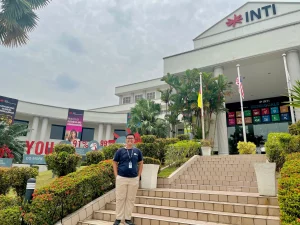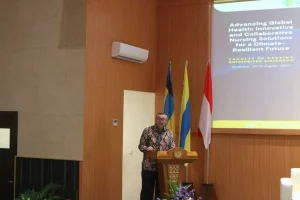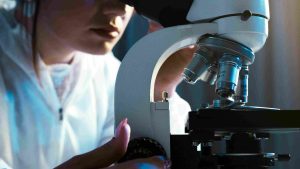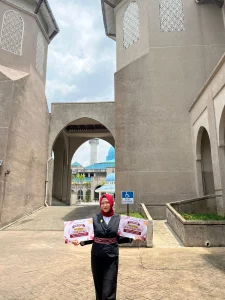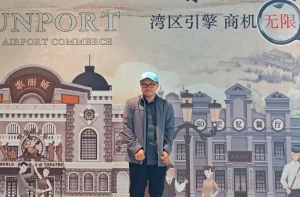UNAIR NEWS – Banyuwangi Regency Government welcomed 374 students for the community service program of learning with community (KKN BBK) of Universitas Airlangga at the Regent’s Office on Tuesday, July 11, 2023. They will be dispersed across three sub-districts and 29 urban villages, including Kabat, Tegaldlimo, and Gambiran.
The Secretary of the Banyuwangi District Government and Assistant for Economy and Development Drs. Dwi Yanto, who represented the regent, delivered two messages to the students. Firstly, he hoped that the students would depart from academic theories and engage in practical experiences. He also encouraged them to actively promote the implementation of the national pilot project in the field of digital services, known as the “Smart Kampung”.
Academic legacy
Drs. Dwi thought that the current model of community service program is way different compared to the previous model. Students who possess skills and academic competencies will have a greater potential to address village issues, especially when aligned with their respective areas of expertise.
“Therefore, it is no longer the time for community service programs to build physical legacy. Rather, it is the time for academic-based legacy that aligns with their respective fields of study,” he said.
Drs. Dwi named the examples for Medicine and Public Health students. They can help reduce and even eliminate stunting in Banyuwangi. While the economics students can encourage the local SMEs to practice adaptive and innovative models with the growth of technology. Besides, accounting students can also train the local communities to build effective financial management.
“Currently, the stunting rate in Banyuwangi is 3.63. By the year 2024, Banyuwangi aims to achieve zero stunting cases,” he said.
In the field of fisheries and agriculture, Banyuwangi offers enormous potential. Students can promote small-scale home gardening in limited spaces. This will contribute to boosting the local economy.

The KKN-BBK students take pictures post the welcoming ceremonies at Banyuwangi Regent’s Office on Tuesday, July 11, 2023. (Photo: Imam Ariadi)
Smart Kampung
In addition, Banyuwangi is currently a national pilot project for digital public services. Drs. Dwi encouraged the KKN-BBK students to foster a technology-aware environment in villages. They can help install the Smart Kampung application to support this initiative.
“Generally, other regions focus on Smart City initiatives. In our case, we are focused on the villages and transform those into Smart Kampung,” he said.
The awareness of using the internet responsibly needs to be fostered. Hence, students can raise the awareness of the locals in each village. This is to ensure that the management and administrative processes for residents can be carried out quickly and effectively.
“The locals don’t have to go to the city. They can simply use the application,” he said.

The Secretary of the Banyuwangi District Government, Assistant for Economy and Development Drs. Dwi Yanto (left) received a memento from the Director of SIKIA UNAIR in Banyuwangi, Prof. Dr. Soetojo dr. SpU (K), at the Office of the Regent of Banyuwangi on Tuesday, July 11, 2023. (Photo: Imam Ariadi)
Building village
Meanwhile, in his speech, the Director of SIKIA UNAIR in Banyuwangi, Prof. Dr. Soetojo dr. SpU (K), mentioned that a total of 379 UNAIR students will be participating in the KKN-BBK program for a month. Specifically, from Tuesday (11/7/2023) until Friday (5/8/2023). These students come from various fields of study, representing all 17 faculties of the university.
They will be dispersed to 7 urban villages in the Kabat sub-district. Additionally, there will be 6 urban villages in the Gambiran sub-district and 8 urban villages in the Tegaldlimo sub-district (with each having 2 groups). On average, each village group will consist of 9-10 students.
Prof. Soetojo stated that during their fieldwork, the students will encounter various types of communities with diverse educational backgrounds. This presents a challenge in effectively delivering the student program to the community.
“You have to communicate well. Without this, you can’t achieve your targets and goals,” he said.
He added that students will conduct at least two important tasks. First, students apply the knowledge they have learned in class. Secondly, together with the community, students strive to build society and nation for creating a better future.
Author: Feri Fenoria



